On the top floor of the Beaver Mill, Sarah DeFusco and Andrew (Kirby) Casteel are working in a room full of cloth. The long table is piled with squares cut from blankets, swatches of fleece and woven cloth in yellows and reds and blues. A sewing machine sits on a long counter by the wall, and an embroidery machine in the corner is stitching in a pattern with a rhythmic beat.
It’s a bright, cold afternoon, and the windows look out at the sun on the bare trees on the opposite ridge. DeFusco is ironing squares of light green linen she plans to re-form into cloth napkins. She loves natural fibers when she can find them, she says.
She and Casteel are becoming known for their colorful crazy-quilt clothing. As a couple, they run a business together — they’re Wallasauce, a brand in North Adams since 2018. And they’re growing. This season they are running holiday markets and connecting with an expanding local community of artisans in the the state’s smallest city, in the mountains.
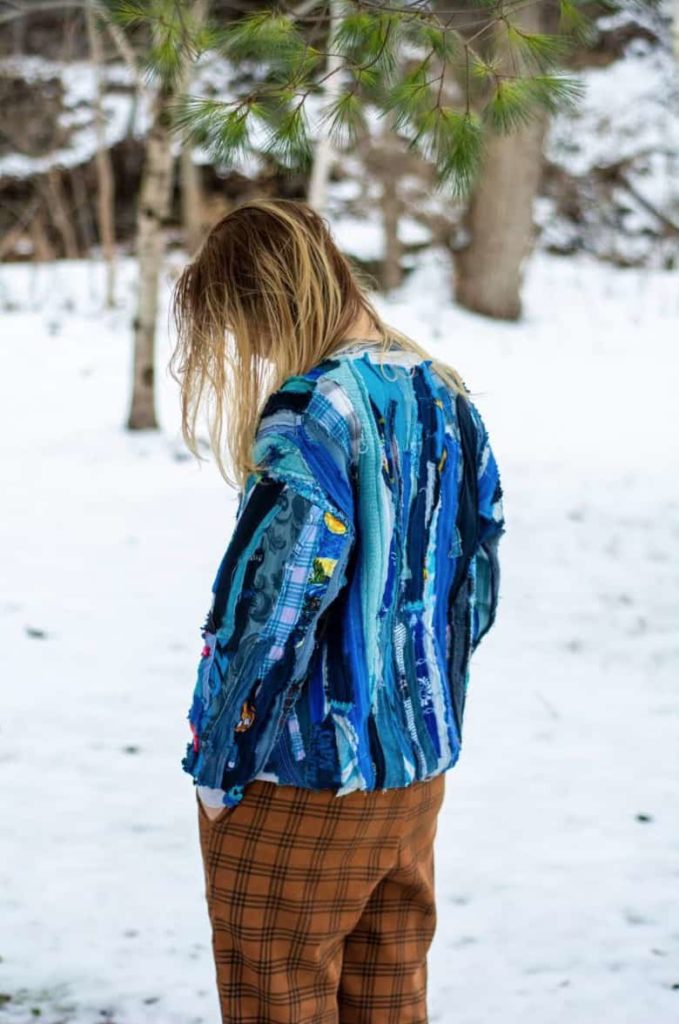
Sarah DeFusco and Andrew (Kirby) Casteel design bright upcycled clothing like this vivid blue Coogi-style sweater through their North Adams clothing brand, Wallasauce. Press image courtesy of the artists.
Avant garde art from American roots
Wallasauce began with a gift, DeFusco explains. She and Casteel met here in North Adams, at Massachusetts College of Liberal Arts, and in their senior year she wanted to find a birthday present for him.
She had a sewing machine, and she had taken a sewing class years before, but she had not often used it, until she made him three shirts from upcycled cloth — they were a bright patchwork of fabric with graphics. And they set off the spark.
At first the two of them were just having fun, she said. In the next two years they both learned to sew. They were working out of their tiny college apartment, making patches and pins, turning worn sweaters into beanies and blankets into sweatshirts. She drew designs …. and Wallasauce was underway.
Now they design their own line of streetwear — vivid Coogis (the word comes from a colorful line of Australian sweaters and has come to mean bright, scrappy clothing), shirts and sweaters, hoodies and backpacks …
Sauce has become a word like swag, Casteel said: a stylish confidence. The name originally comes from their own brand of barbecue sauce. (They adapted a recipe from a friend’s father and named it for him — his name is Wallace.) But they kept it for their clothing line, because for them it fit.
Style and sustainability
They are creating their own look and feel, around color and savvy — and around upcycling. They make their clothing out of fabric that could easily have been thrown away, DeFusco said. And that kind of sustainable re-use has become much more than an inexpensive way to find new material. It has become credo. Their newly redesigned website now begins: Recycling to create the world we want to live in.
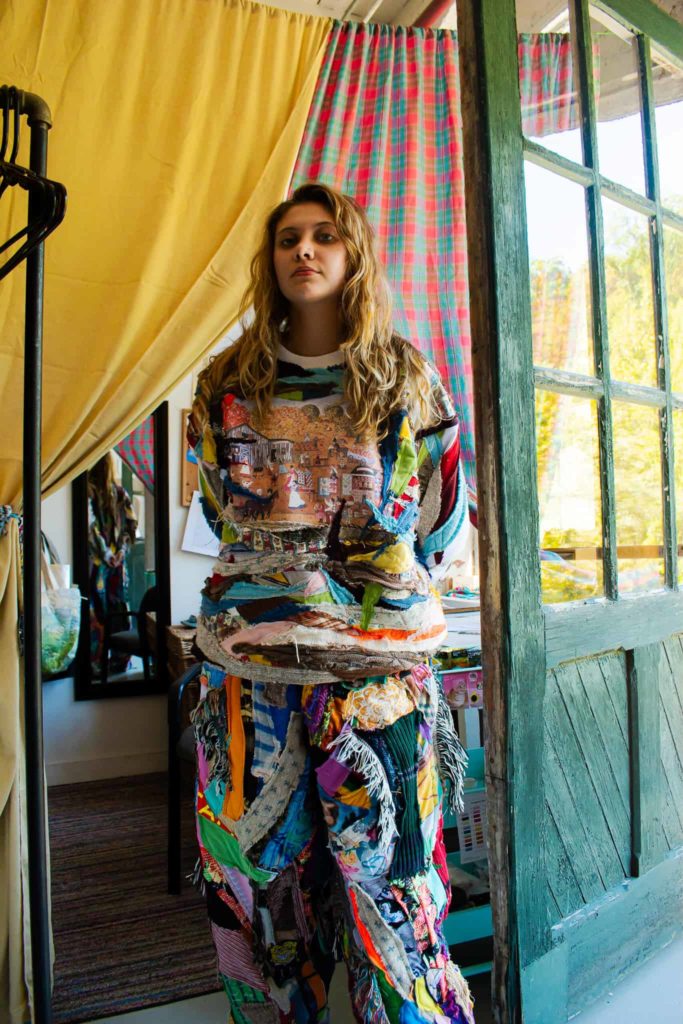
Sarah DeFusco and Andrew (Kirby) Casteel design bright upcycled clothing like this vivid Coogi-style sweat shirt and pants through their North Adams clothing brand, Wallasauce. Press image courtesy of the artists.
Especially now, with the climate and the health of the planet coming forcibly to attention, they want to build their business and their art around sustainability, she said — they want to find resources nearby, to use what they have, to enjoy the pleasure and challenge of transforming what they find into something new, and to waste as little as they can.
She is turning a new batch of undyed linen into bags that will be safe to carry food, she said, the kind she might bring to the co-op for shopping in bulk, for peanuts or popcorn, dried cranberries, chocolate, apricots …
It’s a new way of thinking for her, she said, and it feels steadily more central, more practical and more satisfying.
“I grew up being very wasteful,” she said, “because I grew up in a time when we were conditioned to be single-serve, and to think short-term rather than long-term.”
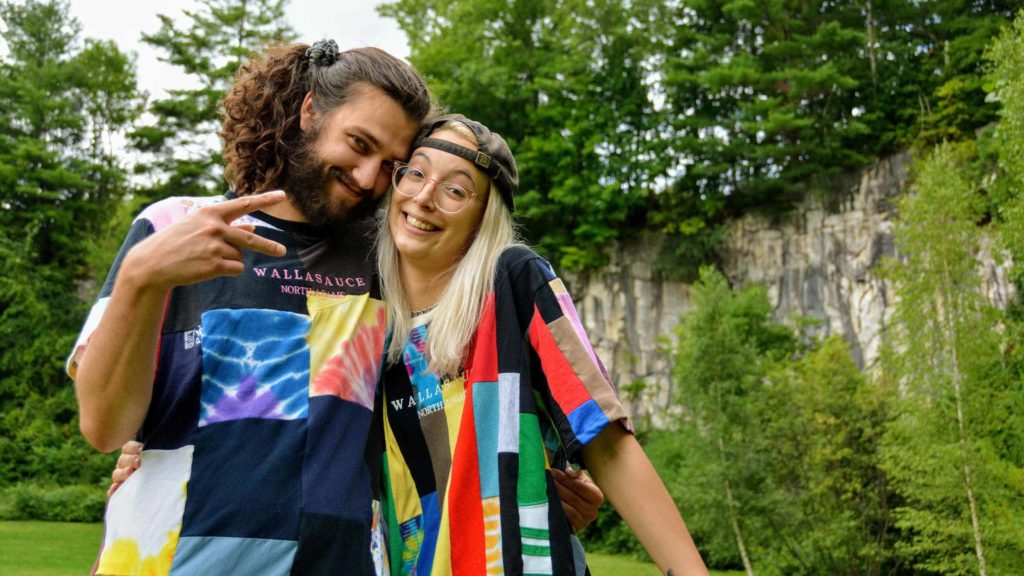
Sarah DeFusco and Andrew (Kirby) Casteel wear the bright upcycled patchwork clothing they make through their North Adams clothing brand, Wallasauce. Press image courtesy of the artists.
She had always been interested in the environment and in sustainability, she said, and as she began living on her own, she began to think about the choices she was making day to day, even ones that seemed simple. Buying new fabric is often expensive, she said. In the pandemic she had to source all of her materials locally, and she began looking for new sources. And what she finds here still surprises her.
“When you look around you, you can find so many resources,” she said. “This linen was given to us free because Assets 4 Artists (at Mass MoCA) has connections with a company who has cut-offs of fabric.”
Weaving a community-wide web
Right now their studio is stacked with bins of vintage cloth from a local family. Delia Marshall’s mother collected fabrics at her home in Williamstown for many years, DeFusco said. Her passion began as a hobby and grew broadly. She would travel the world, looking for them, and so she hand-curated her collection. After she died, Delia and her family wanted to hand on her fabrics to someone who would use them.
“It’s incredible to give a second life to the material,” DeFusco said.
‘Fashion is one of the most wasteful industries. It’s second only to oil.’ — Sarah DeFusco
And she knows Marshall’s family cares — Delia bought clothing DeFusco has made from Marshall’s cloth. Upcycling finds new uses for all the materials, DeFusco said, so they are not thrown away — something that happens far more often than most people realize.
“Fashion is one of the most wasteful industries,” she said. “It’s second only to oil.”
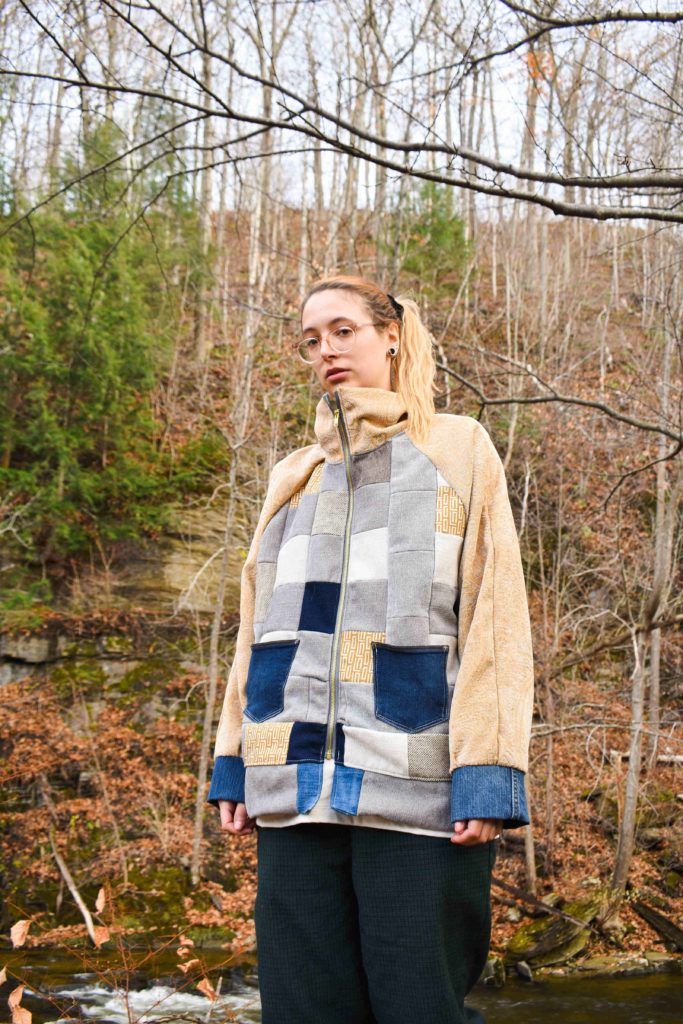
Sarah DeFusco and Andrew (Kirby) Casteel design bright upcycled clothing like thistan and patchwork jacket through their North Adams clothing brand, Wallasauce. Press image courtesy of the artists.
The fast fashion industry makes clothing on seasonal interest, she explained. When new collections come out, what happens to the last season’s clothing that hasn’t sold? Thousands of garments can end up in landfills or shipped to other continents. The system wastes the time and work of the people sewing, who are often very poorly paid and working in very hard conditions, and it wastes the materials they make.
She and Casteel want to give people another choice — a small-scale, local organization creating original and individual work, and sometimes made from cloth rarely made and hard to find.
She enjoys the search, she said. Vintage has become a growing field. Some of her friends will travel to Springfield and farther, looking for clothing and material from consignment, thrift stores, yard sales and attics and estate sales.
“A lot of people don’t know what they have,” she said.
Casteel agreed — he has seen vintage events that can draw large crowds to look through band t-shirts from the ‘80s and ‘90s.
“If you see one for Donkey Kong, it’s probably not made anymore,” he said.
DeFusco encourages people to save cloth, even when it has been packed away — she can often repair or salvage, even when a blanket has mouse holes in it. Local people will bring in clothing they care about and want to see in good hands, she said. One family brought in a wedding dress. She and Casteel even have a box of lace made in Pittsfield, though cloth made in the local mills is hard to find now.
She enjoys the creative challenge in working with the materials they can find, she said, and it gives them freedom at the same time. They can take risks with no pressure and no worries, and the results often surprise her — “You can design something you didn’t even imagine, by the end of it.”
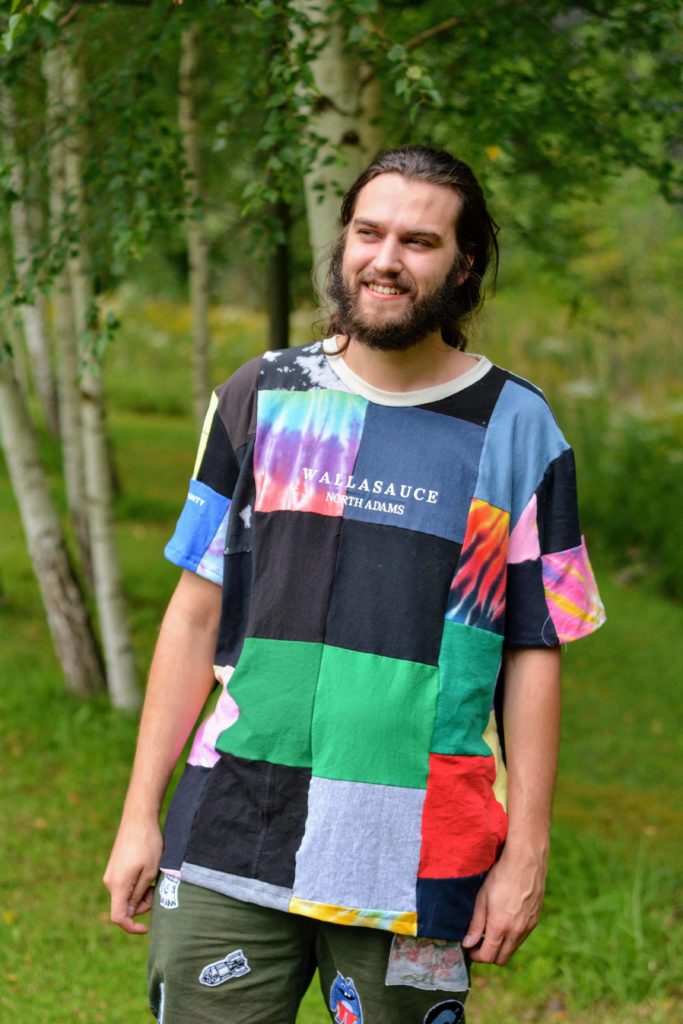
Andrew (Kirby) Casteel wears a bright upcycled patchwork shirt in the style of clothing he and Sarah DeFusco make through their North Adams clothing brand, Wallasauce. Press image courtesy of the artists.
Adapting in the pandemic
Wallasauce has become increasingly well-known for their off-the-wall color, and their brand has grown, even in the pandemic. It hasn’t been easy, DeFusco said, and still, they have found allies.
She worked in the gift shop at Mass MoCA until 2019, she said. When the pandemic hit, the museum temporarily closed, along with almost all local shops and museums, and the gift shop closed with it. In that uncertain summer, Wallasauce won an Artists@Work grant — one of six that The Office Performing Arts+Film offered to six artists or organizations and six cultural institutions, to keep artists afloat in Covid.
The director of the Office, Rachel Chanoff, also serves as Curator of Performing Arts and Film at Mass MoCA, and she and Mass MoCA worked with Wallasauce, DeFusco said. The grant in theory covered a 40-hour work week, and since she and Casteel both work in the business, it covered only one of them, not both. But it gave them enough supplemental income to keep going, and it helped them to build community around their work. As part of the grant program, they offered free sewing classes.
“We made friends out of them, and community connections,” she said.
Some of them have kept in touch and learned to sew, she said. She taught hand-sewing for a group of 15-year-olds and workshops for all ages on how to use a sewing machine. Many people have sewing machines they don’t know how to use, she said, often their mother’s or their grandmother’s.
‘I want something to look handmade. I want someone to look at it and say wow, this looks special or different.’ — Sarah DeFusco
She and Casteel have restored and re-threaded more than a few sewing machines too, and they have worked with Tony Pisano, a North Adams beekeeper, machinist, musician, to repair a few of them that needed more extensive work. Older sewing machines can easily last for decades, DeFusco said, while newer ones often break within a year or two — and older dewing machines are often easy to find, and cheap.
They have a sewing machine they picked up off the side of the road, Casteel agreed, and it’s venerable enough to have a knee pedal.
They plans to return to those sewing machine workshops after the holidays, DeFusco said, not as classes but as lessons for anyone who wants to learn. They have also been offering informal fix-it Fridays with Jessica Sweeney at Savvy Hive, mending clothing, refitting and transforming.
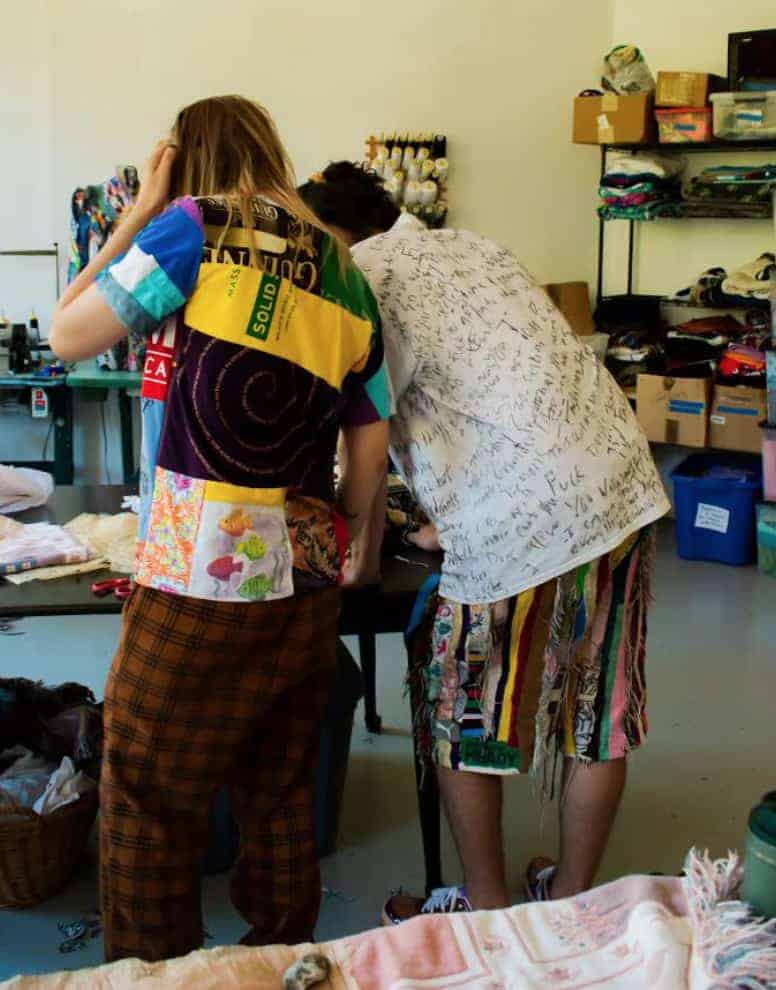
Sarah DeFusco and Andrew (Kirby) work in their Beaver Mill studio for North Adams clothing brand, Wallasauce. Press image courtesy of the artists.
Sewing for a new generation
They enjoy the freedom a sewing machine gives them to re-shape clothes, DeFusco said. And she loves making custom clothes for individual people. She loves to talk with someone as she’s making clothing for them, and talk about what they need and want it to become.
“Where else would you be able to get this done?” she said.
She finds it powerful, exchanging ideas and making someone’s vision come to life. She recalls a friend close on seven feet tall who has a hard time finding anything large enough to wear. She made him a pullover, and he loved it — and asked her to make him two more. He liked them not only for the size and fit, but for their fiber and color, shape and style.
“It’s clothing that expresses him,” she said.
Casteel sees sewing coming back widely among their generation, as a skill and as an artform.
“The sewing community is so talented,” he said, “not just locally but on Instagram and in the internet — you can see things you won’t believe. People will make jeans from scratch, and they’re actually one of the hardest things to make.”
‘The sewing community is so talented, not just locally but on Instagram and in the internet — you can see things you won’t believe.’ — Andrew Casteel
Closely fitted and sleek pants are a challenge, he said, made from stiff denim and cut to fit cleanly, with their metal rivets and zippers, and he has seen amateurs sewing from home who make it look easy.
DeFusco enjoys their skill, but she isn’t out to make clothing that looks like a designer model. She wants something more original in her hands.
“I want something to look handmade,” she said. “I want someone to look at it and say wow, this looks special or different. No shade to people who make something with precision, because it’s impeccable, but being sustainable isn’t perfect — it’s a matter of doing our best.”
Kirby agreed as he thought of artists he admires, the improvisational brilliance of a Basquiat painting or a DJ remixing music.
“It’s why avant garde art is the best,” he said. “It looks so unfinished, and yeah, that’s what I intended. It’s a strike of emotion.”

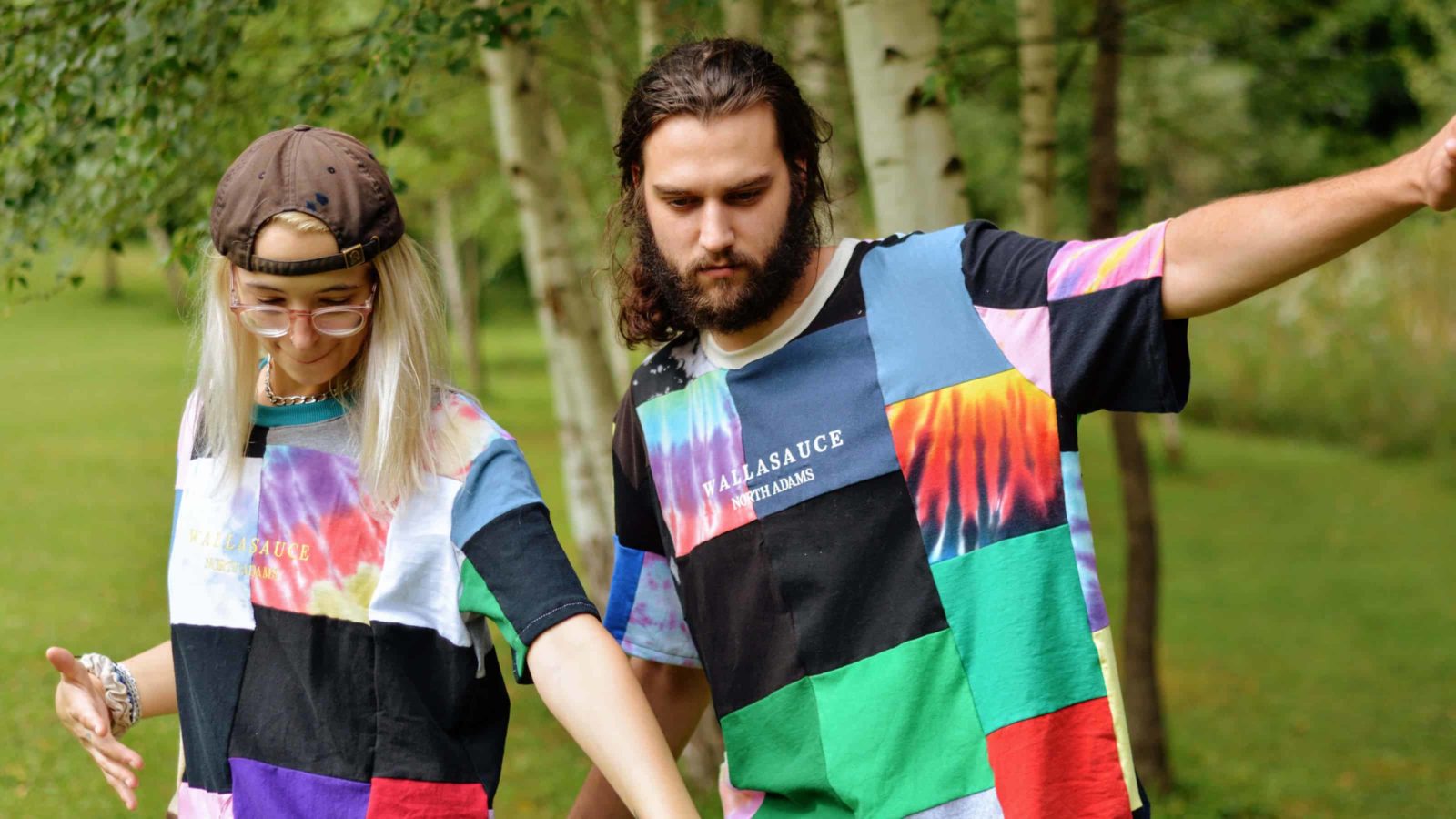
Would like to order sweatshirt/coat had a northern coloring had pine trees… displayed… female was wearing it in Mendon ma… have pic if needed… thank you Dana
Hi Dana, I’m a local journalist, and I’m sure Wallasauce would loveto hear from you. I’ll pass your message along to Sarah Fusco, and thanks very much.